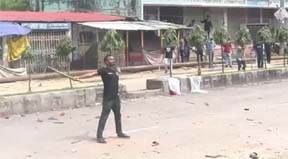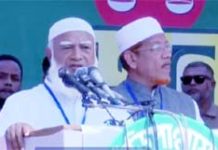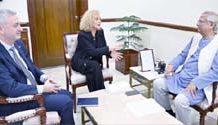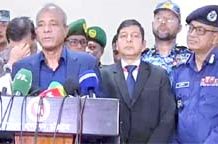C T Online Desk: The daylight killing of student activist Abu Sayed in front of Begum Rokeya University on July 16 has become a defining moment in Bangladesh’s intensifying quota reform protests.
Sayed, 23, was one of six demonstrators killed in violent clashes that erupted across multiple cities, including Dhaka, Chittagong, Rangpur, and Sylhet.
In a video widely circulated on social media, Sayed is seen standing with his arms outstretched moments before being fatally shot — allegedly by police — triggering outrage among students and citizens nationwide.
The violence follows weeks of escalating tension between student protesters and authorities.
On the day of Sayed’s death, massive demonstrations swept campuses across Bangladesh.
Protesters demanded an overhaul of the quota system in public sector recruitment, which they argue is outdated and discriminatory.
Clashes reportedly intensified when ruling party affiliates — members of Bangladesh Chhatra League and Jubo League — joined law enforcement in confronting demonstrators.
In Dhaka’s Shahbagh and Rajshahi University, students fought back, expelling Chhatra League activists and seizing control of dormitories.
Chhatra League leaders’ rooms were also vandalized at various institutions.
In the aftermath, then-prime minister Sheikh Hasina’s government imposed emergency measures.
All universities, colleges, and schools were ordered to close indefinitely.
The University Grants Commission instructed residential halls to be vacated. The HSC examination scheduled for July 17 was postponed.
Border Guard Bangladesh (BGB) was deployed in six districts to curb further unrest.
On July 15, Chhatra League members had clashed with students across campuses, leaving hundreds injured.
Protest leaders had planned coordinated rallies for 3pm the following day, but tensions boiled over from early morning.
Political reactions were swift.
Awami League General Secretary Obaidul Quader warned protesters not to mistake restraint for weakness, saying a “crackdown” could follow if provocation continued.
Chhatra League President Saddam Hossain declared the party’s legacy would endure beyond student movements.
BNP Secretary General Mirza Fakhrul Islam Alamgir accused the government of “standing against the people” and called for nationwide solidarity with the student cause.
He warned that delaying free elections would deepen instability.
Civil society figures condemned the killings.
A joint statement by 114 eminent citizens — including Syeda Rizwana Hasan, Professor Asif Nazrul, economist Anu Muhammad, and photographer Shahidul Alam — demanded an independent investigation and punishment for those involved in the attacks.













